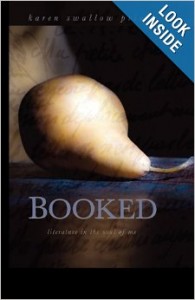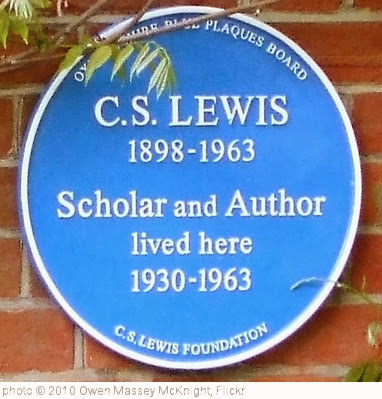My mom, my sister and I read Ms. Prior’s literary memoir for our GED Family Book Club in November. Karen Swallow Prior is a professor of English at Liberty University in Virginia. Her bio at the Liberty website says:
“She was raised in a strong Christian home and received Christ at a very early age. But it wasn’t until she was in her twenties that Dr. Prior was introduced to the concept of the Christian worldview. This was when her faith became real and she embraced the challenge of not only living biblically, but thinking biblically, too. Her life has never been the same.”
 The memoir deals mostly with Ms. Prior’s growing up years, the years before “her faith became real.” She writes in each chapter about a particular author or work of literature and about how that literary work informed her thoughts and gave her food, real food, for spiritual and emotional growth. I liked how the author wove her own story through the stories she read and demonstrated the power of words and stories to change our lives, for better or for worse.
The memoir deals mostly with Ms. Prior’s growing up years, the years before “her faith became real.” She writes in each chapter about a particular author or work of literature and about how that literary work informed her thoughts and gave her food, real food, for spiritual and emotional growth. I liked how the author wove her own story through the stories she read and demonstrated the power of words and stories to change our lives, for better or for worse.
Ms. Prior starts with the premise that she takes from John Milton’s Areopagitica: “God uses the things of this earth to teach us and shape us, and to help us find truth.” (p.10) She paraphrases Milton, saying that “truth is stronger than falsehood; falsehood prevails through the suppression of countering ideas, but truth triumphs in a free and open exchange that allows truth to shine.” As Milton put it, “Since therefore the knowledge and survey of vice is in this world so necessary to the constituting of human virtue, and the scanning of error to the confirmation of truth, how can we more safely, and with less danger, scout into the regions of sin and falsity than by reading all manner of tractates and hearing all manner of reason? And this is the benefit which may be had of books promiscuously read.” I tend to agree and have generally allowed myself and my children (within reason) to read whatever we thought might be of benefit to our minds and our education. I believe in this habit of “reading promiscuously” and believe it has been of more benefit than harm to me and to my children.
That’s not to say that reading with very few boundaries is not sometimes perilous, and scary for the parent in particular. Some ideas are dangerous and even evil. But I believe that Truth will prevail, as long as we are open to the truth. And it has been my experience that denying myself or my children access to certain books only makes us more curious and at the same time less prepared to encounter, apprehend, and interpret that idea that has been hidden and forbidden and made to seem alluring by its very proscription. Whereas discussion and reading and more discussion and reading and placing the ideas we read about in juxtaposition to God’s Word and then reading and talking some more—these are the best ways to learn and grow and become fully equipped for the battle of worldview and philosophy in which we are engaged.
So, that’s just the first chapter. This memoir is really a book full of ideas and things to think about (or write about). In the second chapter (Charlotte’s Web) Ms. Prior discusses the power of words:
“All words are names, for all words signify something.
The power of naming is a subset of the power of all language. God spoke the universe into existence and, in giving us the gift of language He gave us a lesser, but still magnificent, creative power in the ability to name: the power to communicate, to make order out of chaos, to tell stories, and to shape our own lives and the lives of others.
The Book of Proverbs says that death and life are in the power of words. To choose a good word, to assign the right name, to arrange proper words in the best order: these are no easy tasks.”
So true, and so reminiscent of not only Charlotte, the spider with a talent for choosing the right word, but also of Madeleine L’Engle and her emphasis on the power of naming. We are shaped by the names we give and are given. If I call myself (because God first called me) a child of God, I become a new creation indeed.
I could write a paragraph or a page or even, in some cases perhaps, a book of my own about each of the following quotes from Ms. Prior’s book, but I will simply leave them with you to ponder and perhaps one or all of these excerpts will tantalize and impel you to read the book yourself. (WARNING: Some of Ms. Prior’s life experiences, having to do with growing up during the sexual revolution of the seventies, before “her faith became real” are more appropriate for mature readers.)
“To respond emotionally to God directly is more than I can bear. So God in his goodness has bestowed the gift of literature.”
“Indeed, the only thing that stands between me–or anyone–and tragedy is grace.”
“Well, I believe in a God who not only intervenes in human affairs—again and again–but one who also makes banquets out of stale bread.”
“Life is grounded in the mundane. But the mundane has a bad rap. The word simply means ‘world’; its origins are shared with the same root word for ‘mountain.'”
“God is nothing if not a poet. And nothing if not elaborate in both his imagination and composition. Elaborate, as the root of the word suggests, means brought about by labor and care, planned with painstaking attention to details or intricate and rich in detail. Just like a metaphysical conceit. To join the unlike–a man and a woman, reason and passion, physical and spiritual—is the work of the poet and of God.”
The books and literary works that Karen Swallow Prior discusses in the book are:
Charlotte’s Web by E.B. White.
The poetry of Gerard Manley Hopkins, especial the poem “Pied Beauty”.
Great Expectations by Charles Dickens.
Jane Eyre by Charlotte Bronte.
Tess of the D’Urbervilles by Thomas Hardy.
Gulliver’s Travels by Jonathan Swift.
Madame Bovary by Gustave Flaubert.
Death of a Salesman by Arthur Miller.
The metaphysical poetry of John Donne.
The poetry of Matthew Arnold and Thomas Hardy.
If you are a fan of any of the above, Ms. Prior’s very personal take on the meaning and application of these literary works to her own spiritual journey would be illuminating and engaging.
